Rocky Horror Picture Show Fan Art Minimalist Fishnet Legs Poster
The Rocky Horror Motion picture Show: A Cult Classic that Challenged Sexual Mores

"I'm gonna requite you some terrible thrills / Like a science fiction double feature"
In 1973, The Rocky Horror Bear witness debuted on the British stage every bit a campy musical. Only 2 years subsequently, in 1975, a movie version was released in the United States – renamed The Rocky Horror Moving-picture show Show – and while the original release was considered a flop at the time, the movie apace attained cult status. Xl years after its release, limited midnight showings are still held in college towns, art houses, and other independent venues.
The film is true to its army camp theater ancestry and is framed in the style of 1940'southward- and 1950's-era scientific discipline fiction B-movies. The fact that it is "science fiction" (a gutter genre at the fourth dimension) is meant to excuse its excesses and weak elements – mainstream audiences were never supposed to take it seriously, and forgive inconsistent plot points and over-the-top costumes and interim. Nevertheless science fiction, by virtue of the fact that it is outrageous and plainly "non existent," frequently uses that license to betrayal and challenge truths virtually the social mores of its audience. In the instance of The Rocky Horror Motion picture, the lessons are primarily ones of sexual deviancy, and how sexually-oriented fringe communities – such equally the '70s gay pride movement – were seen and portrayed by the mainstream society and how they reacted to that portrayal.
The moving-picture show's plot is paradoxically both simple and ridiculously complicated. Brad and Janet (played by Barry Bostwick and Susan Sarandon), are "ii normal, healthy kids" forced to seek shelter in a castle when their automobile gets a flat tire in a storm. Once within the castle, they encounter Frank N. Furter (Tim Back-scratch) and his bizarre and gender-bending assortment of servants and guests. Brad and Janet are immediately stripped of their tempest-soaked clothing and spend the rest of the movie in their underwear, a symbolic removal of social norms. Over the course of the evening they face many sexual and societal transgressions to which they must adapt. Eventually, they abscond the castle in their underwear, barely escaping with their lives.
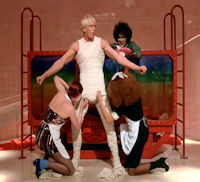
The name Frank North. Furter is a play on words, meant to evoke the slang usage of hot dog synonyms to refer to male person genitalia, but also to conjure the allusion of Dr. Frankenstein from Mary Shelley's novel – for, as Brad and Janet learn, Frank has a lab in the castle where he is creating Rocky (Peter Hinwood), the perfect (male) lover for himself. Rocky, not coincidentally, is "built-in" in a tank of rainbow-tinted glass, conspicuously meant as a reference to the Pride Flag, in utilise by the LGBT customs since the early 1970s.
The commemoration of Frank's successful experiment is cut brusque by Eddie, a failed experiment who escapes from "the vault" and is subsequently killed by Frank. Frank then immediately marries Rocky, but despite retiring to his honeymoon suite with his self-made ideal lover, he still takes fourth dimension during the evening to visit (and have sex with) both Brad and Janet in their separate bedrooms. Dr. Scott, an old friend of Brad and Janet'southward, afterward arrives at the castle in search of Eddie, who was his nephew before he became Frank's lab experiment. Eventually it is revealed that all the castle's inhabitants are aliens; ii of Frank's supposed servants, Riff-Raff (Richard O'Brien) and Magenta (Patricia Quinn), are actually his social superiors, and they kill both Frank and Rocky, and return the castle to its planet of origin.
"Hither's a band to prove I'thou no joker"
The flick begins with Brad and Janet, a happy couple leaving church newly married. In the background a billboard for a new housing development proclaims boldly that the town of Denton is "The Home of Happiness!" Brad stumbles his way through several simulated starts before bursting into a song wherein he eventually proposes to Janet. His sincerity is supported by the appointment ring he pulls from his suit jacket: "Here's a ring to prove I'one thousand no joker," he sings.
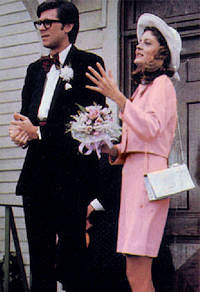
This opening scene is entirely almost establishing social norms and customs. Though the film was released in 1975, the dress and behaviors of the "normal" people attention the wedding ceremony are advisable to an earlier generation: the parents and authorization figures of the original 1975 audition. This bygone-era feel is part of the show'south presentation of itself as a nostalgic sci-fi double characteristic – the opening song references not only George Powell, just also Faye Ray, Flash Gordon and other silver screen classics. But the clash of cultures represented in the flick is a generational as well as a sexual one, and the motion-picture show mocks the previous generation's customs even every bit it embraces the nostalgia of the era.
The newly-married happy couple drive off in a machine emblazoned with the shoe-polished words, "She got hers, at present he'll get his!" The joke being, of class, that having accomplished marriage – which is presumed to be a woman's highest goal within this socio-economic group – the new wife will now allow her hubby sexual access – which is presumed to be his highest goal. Brad'southward offering of a ring is prove that he is being respectable past the standards of his customs; he is non request Janet for sexual activity without offering social benefits in return. In brusque, he is proposing a legitimate contract, quid pro quo.
It is for this reason that the viewer tin can forgive Janet – if she needs to be forgiven – when she later accepts Frank's advances, for Frank has used his conflicting technology to disguise himself as Brad. Brad is "no joker;" the contract has been struck. Upon finding out that she has engaged in sexual intercourse with Frank instead of Brad, Janet exclaims, "You're to mistake! You're to blame! I was saving myself!" Frank replies with a libidinous smile, "Well. I'm sure y'all're non spent, yet."
Frank's response is some other play on words; he is using "spent" in the sexual sense – he thinks there is more sex to be had. It is besides, all the same, a direct reference to the concept of virginity as having a tangible value, even a cash value. By the standards of Janet'southward customs, an engagement band is payment for virginity. To Frank, virginity is worthless, possibly fifty-fifty a detrimental quality. With it gone, Janet has more to offering in Frank'southward eyes, not less.
"Dammit, I knew I should have gotten that spare tire fixed!"
Janet'southward exclamation of Frank'southward blame is not the only time the effect of guilt and responsibility ascend in the movie; over again and once again characters face up the consequences of straying from gild'southward accepted behaviors. At the beginning of the film, a narrator character referred to in the credits equally "The Criminologist" (Charles Grayness) takes pains to explain to the viewer how Brad and Janet came to knock on the door of a chilling castle then far exterior their usual environs. Brad and Janet, "two young, ordinary, good for you kids" (emphasis mine) set out to visit a friend i night. "It's true," The Criminologist continues, "at that place were dark tempest clouds: heavy, blackness, and pendulous, toward which they were driving. Information technology'due south truthful also that the spare tire they were carrying was badly in need of some air. But they, being normal kids, and on a night out, well, they were not going to let a storm spoil the events of their evening."
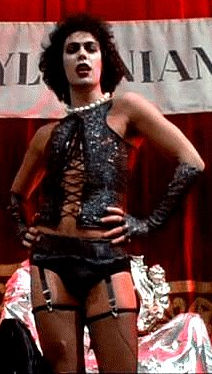
The implication is obvious – inexperienced, headstrong, and foolish, Brad and Janet took risks they should not have taken, and those risks directly contribute to their fate. Footstep off the path, fifty-fifty innocuously, and the side by side step could lead you face to face with Tim Curry in drag, surely an intimidating prospect for anyone unprepared.
The themes of error, blame, and punishment are further illustrated in the instance of Eddie (played by Meat Loaf), who bursts from "the vault" where Frank had imprisoned him only to be killed and and then afterwards served equally the main dish in a cannibalistic dinner for the castle's inhabitants and guests. Dr. Scott (Jonathan Adams) describes Eddie every bit beingness bad even as a child: "When Eddie said he didn't like his Teddy you knew he was a no-good kid." Eddie is likewise described as enjoying rock and curlicue, porn, and drugs. Brad and Janet eventually leave the castle deflowered and forever altered … but alive. Eddie'due south social transgressions and irresponsibilities are far greater, and his life becomes forfeit as a direct event. He is defiled not just in life but besides in death.
It is, however, Eddie's death (and subsequent re-advent as dinner) which proves to be Frank's undoing, a transgression for which fifty-fifty he must pay a toll. When Riff-Raff and Magenta reveal themselves to be Frank's superiors instead of servants and announce that they intend to kill him, Brad exclaims, "What's his offense?!" Dr. Scott answers, "Y'all saw what became of Eddie."
More subtle, merely besides a contributing factor to Frank's demise, is the concept of personal responsibility to one's lovers and friends. Columbia (Nell Campbell), another retainer of Frank's, laments Frank'southward lack of fidelity. "Commencement y'all spurn me for Eddie," she says, "and and so you throw him off like an old overcoat for Rocky! You chew people upward and spit them out again! I loved you!" Every bit Riff-Raff and Magenta threaten Frank with death, Columbia looks on in tears merely doesn't move to save him – she loved Eddie, also, after Frank rejected her. When Riff-Raff finally pulls the trigger and kills Frank, Magenta expresses surprise, saying that she thought he liked Frank, and that Frank liked him. "They never liked me!" Riff-Raff answers. "He never liked me!" Perhaps in the final tally, Frank's greatest crime was not treating his people with more affection and respect, a societal requirement that – at least in this instance – transcends sexual mores. Fifty-fifty when it is permissible to take casual sex activity, the film seems to say, the people themselves should not be treated casually. Even aliens want to be loved and respected every bit sexual partners.
"Affect me, oh Brute of the Dark!"
In his entrance number, the transvestite Frank North. Furter describes himself every bit "not much of a human being by the light of day, but by night I'm a helluva lover." The character is never seen during the daytime; the plot takes place entirely in the grade of a single evening, so the viewer has no way of knowing what sort of contrasts might exist in Frank's dress or demeanor when the sun is shining. However, to individuals in the audition of 1975 who self-identified as social deviants, this day/night dichotomy would have had an obvious parallel in their own lives: socially-conforming clothes and gender performance during the mean solar day, followed by an evening of costumed debauchery in clubs. If their own version of "costumed immoderacy" was not every bit wild or uninhibited equally Frank's, they could, perchance, live vicariously through him for a couple of hours.
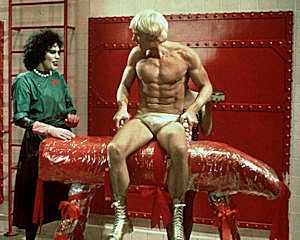
The theme of nighttime is one that comes up repeatedly during the movie. When Janet is encouraging Rocky to accept sex with her, she says, "Touch me, […] oh Animate being of the Night!" He is, after all, the product of Frank's mad science – non a born man, just a created one: a creature. If Frank is only "Frank N. Furter" during the night, then "Fauna of the Night" is an apt title for Rocky, as "the Night" can exist said to exist his lineage.
During the movie's terminal act Riff-Raff and Magenta talk over returning to their home planet, Transsexual, in the star arrangement Transylvania. Riff-Raff refers to Transsexual'due south "moon-swept shores," and Magenta says, "Sweet Transsexual, Land of Night. To sing and dance once more to your refrain …." On the planet Transsexual, the viewer learns, information technology is always dark, always the time of sexual ability; there is never a need to wear a daylight disguise and pretend to be normal. Riff-Raff and Magenta, aliens who never belonged on Earth, clearly long to return to their domicile. Despite the military camp and ridiculous nature of the plot, the idea of such a world must have been an enjoyable one to the sexual non-conformists in the audience in 1975.
"Social club must be protected!"
After exclaiming that Frank should die for what he has done to Eddie, Dr. Scott adds, "Gild must be protected!" Eddie's death serves every bit a convenient excuse for Frank's execution, simply it is simply one reason that Frank cannot be allowed to interact with Earthlings. His insistence upon flaunting sexual custom is a far more than insidious crime than mere violence and makes his very presence on Earth a danger.
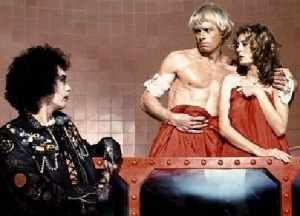
Proof of this danger is seen in the effect Frank has on Janet, who so treasured her virginity – afterwards Frank leaves her bedroom to become to Brad's, Janet wanders the castle in her underwear, looking for someone else with whom to have sex. She sees a video screen that shows Brad's bedroom where he and Frank are in bed together, evidently enjoying post-coital bliss, and despite that she has made an identical transgression she cries out, "Oh, Brad! I loved you!" Loved, by tense: Brad is soiled in her eyes, and she cannot forgive him this fault. Instead, she turns to Rocky for the physical interaction she craves, proverb, "Now all I want to know is how to go. I've tasted blood and I want more. […] Toucha, toucha, toucha bear on me, I wanna be dingy." The metaphoric blood in the water here is from Janet's broken hymen, but the phrase also evokes predatory behavior – Janet is at present a shark, seeking fresh meat.
Even the staid Dr. Scott is not immune from Frank's corruptive influence. In the movie'southward climax, Frank has dressed Brad, Janet, Columbia, and Rocky into clothing and make-up that mirrors his own – after removing their ain clothing (and therefore their social identities) early in the pic, he remakes them all into his ain prototype. He is Pygmalion; to him, everyone he meets is Galatea. Dr. Scott he leaves mostly untouched, notwithstanding during the grade of the final vocal, Dr. Scott is freed from bondage just to discover his legs are no longer under his own control. Formerly paralyzed and bars to a wheelchair because of it, Dr. Scott's legs – at present dressed in fishnet stockings and bright red heels – begin to trip the light fantastic toe despite his efforts to cease them. Dr. Scott has committed no transgressions of which the audience is aware, but only being in Frank's presence has had a deleterious consequence. As The Criminologist narrates, "just a few hours afterwards announcing their engagement Brad and Janet had both tasted … forbidden fruit. This in itself was proof that their host was a man of piffling morals … and some persuasion." It is this "persuasion" that makes Frank someone from whom society must be protected.
Or, every bit Riff-Raff puts it, "Frank Due north. Furter, information technology'south all over, your mission is a failure; your lifestyle'southward likewise extreme." The picture show celebrates sexual deviancy, but also warns of the dangers.
"Don't dream it; be it!"
Frank's final musical number of the movie is the song "Don't Dream It," in which he sings the lines, "Give yourself over to absolute pleasance, swim in the warm waters of sins of the flesh. […] Sensual daydreams to treasure forever […] Don't dream it; be information technology!"
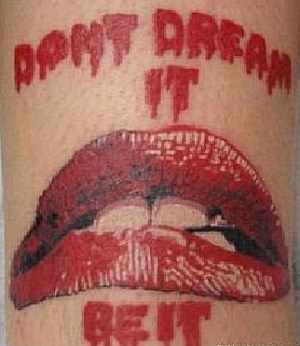
In the near four decades since the pic's release, in thousands of theaters on thousands of nights, audiences have sung these lines forth with Frank. For despite the picture show's poor initial reception, Dr. Scott and The Criminologist were correct: Frank's persuasive influence has proven too powerful to resist, and generation later on generation of movie goers take been infected past it. While initially aimed at a hidden sub-culture, the themes of sexual exploration found fertile footing in the progressive 1970s and beyond. Audience participation with the movie has go legend, equally viewers – similar "normal, healthy" Brad and Janet – cease being passive observers and interact actively with the deviants of the story. En masse audiences quote lines, throw rice and toilet paper at the screen, and add together boosted dialogue. Someone who has never participated in a Rocky Horror audience is called a "virgin", and at that place are additional rules for dealing with such a newcomer. Audition participation has get an elaborate and well-loved ritual.
Cult movies get footling recognition in academic or disquisitional circles – they are frequently cheaply made and considered to be disposable entertainment. But there is nothing "disposable" virtually The Rocky Horror Flick Bear witness, despite its campy manner and obvious narrative flaws. As a piece of film, it is not, maybe, a shining instance of cinematic achievement, but what it lacks in cinematic finesse it makes upward for in social relevancy. As a sub-culture touchstone, it reigns equally male monarch of the cult movies, and at that place is no denying its staying power or fanbase. Frank's lifestyle may be "farthermost," but there are still enough of picture-goers just waiting to do the Time Warp again.
What exercise you lot recollect? Leave a comment.
Receive our weekly newsletter:
jenningsforen1992.blogspot.com
Source: https://the-artifice.com/the-rocky-horror-picture-show-cult-classic-sexual-mores/
0 Response to "Rocky Horror Picture Show Fan Art Minimalist Fishnet Legs Poster"
Post a Comment